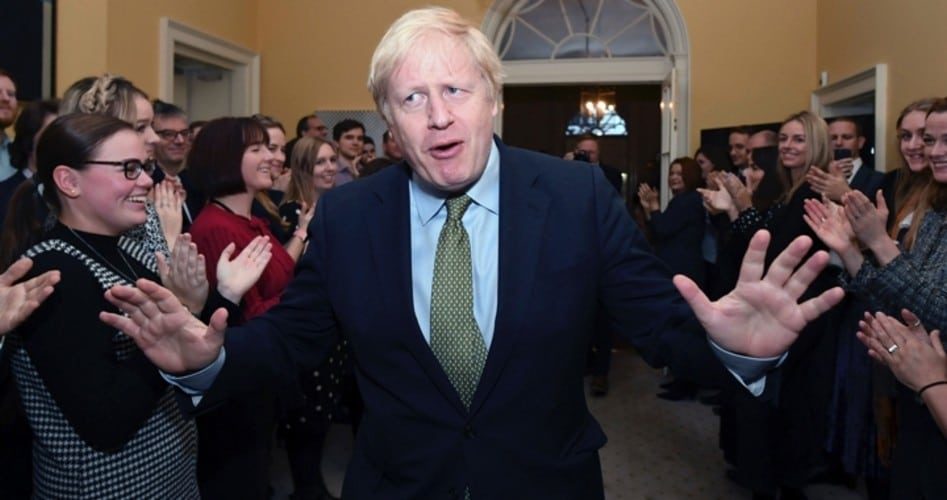
Boris Johnson and his Conservative (Tory) Party won yesterday’s general election in the United Kingdom by a landslide margin. Needing 326 seats to gain a governing majority in the House of Commons, the Tories managed to secure 365 seats, giving them a large majority.
“We broke the deadlock, we ended the gridlock, we smashed the roadblock and in this glorious, glorious pre-breakfast moment, before a new dawn rises on a new day and a new government, I want first of all to pay tribute to good colleagues who lost their seats through no fault of their own in the election just gone by,” Johnson told supporters outside of Number 10 Downing Street early this morning.
It was the Conservative Party’s best showing since the 1980s, when Margaret Thatcher led the Tories to huge victories.
The Labour Party came in a distant second, winning 203 seats. It was their worst showing in 85 years. Labour leader Jeremy Corbyn, who had hoped to lead a global socialist revolution, announced that he would step down from his leadership role and would not lead the Labour Party into another election. A new Labour Party leader will be selected some time in the new year.
“I’ve done everything I could to lead this party,” a distraught Corbyn said. “And since I became leader the membership has more than doubled and the party has developed a very serious, radical yes, but serious and fully costed manifesto.”
But that socialist manifesto — along with Labour’s intransigence on Brexit — led to the worst Labour Defeat in eight decades.
The Scottish National Party (SNP), which favors Scottish independence from the United Kingdom, won 48 seats. The rest of the vote was split between the Liberal Democrats (11 seats), the Democratic Unionist Party of Northern Ireland (eight seats), Sinn Fein (seven seats), Plaid Cymru (four seats) and the Green Party (one seat).
The much-ballyhooed Brexit Party led by Nigel Farage won no seats. Nevertheless, Farage was quite happy with the election results and the Brexit Party’s influence, telling the BBC that he and the Brexit Party helped the Tories win many seats that Labour might have held otherwise.
“I killed the Liberal Democrats and I hurt the Labour Party,” Farage said.
The Brexit Party, in fact, stood down and didn’t run in 317 Conservative-held seats. Farage believes that that decision was a huge factor in the Tory victory. “I can tell you that if we had stood in every seat in the country it would have been a hung Parliament,” Farage said. “That would have been a disaster.”
In the previous government, before the September defections of several Conservatives owing to disagreements with Johnson over his handling of Brexit, the Conservatives had to depend on a shaky alliance with the Democratic Unionist Party of Northern Ireland for their majority. This election will allow Johnson and the Tories an unshakable governing majority as long as they can agree between themselves on the way to move forward.
The 21 Conservative rebels, who pushed back against Johnson in September, ultimately leading to their ouster from the party, had a bad night as well. Ten of the rebels had their membership restored on October 29, but only four of those stood in yesterday’s election. All four won those seats; the rest did not stand for election and were replaced by other Conservatives who won those seats. None of those rebels who ran independently or as part of a different party won their races.
The Conservative victory was hailed by President Trump, an ally of Johnson. Trump tweeted, “Congratulations to Boris Johnson on his great WIN! Britain and the United States will now be free to strike a massive new trade deal after BREXIT. This deal has the potential to be bigger and far more lucrative than any deal that could be made with the E.U. Celebrate Boris!”
While European leaders also congratulated Johnson, they were also well aware that the current Brexit deal may no longer be sufficient now that the prime minister has a large majority to play with. Johnson has said many times that he would prefer to have a deal in place with the E.U. before leaving, but he may put a no-deal Brexit back on the table as a negotiating tool if nothing else works.
EU Council President Charles Michel, the host of the upcoming EU summit said, “We are ready for the next steps and we will see if it’s possible for the British Parliament to accept the Withdrawal Agreement and take a decision.”
And while Brexit itself wasn’t officially on the ballot yesterday, Brexit won big. Johnson and the Conservatives ran on a simple three-word slogan: Get Brexit Done. With the next deadline to leave the European Union set for January 31, 2020, it now seems probable that the wish of the British people, who voted to leave the European Union in 2016, will now finally be fulfilled.
Photo: AP Images
James Murphy is a freelance journalist who writes on a variety of subjects with a primary focus on the ongoing anthropogenic climate-change hoax and cultural issues. He can be reached at [email protected].



